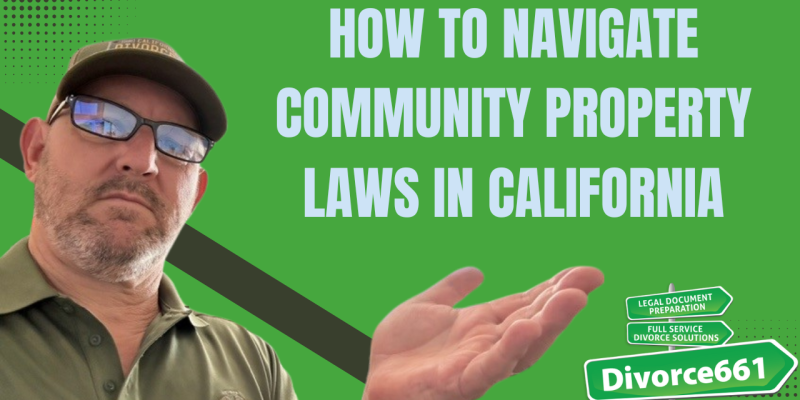How to Navigate Community Property Laws in California
I’m Tim Blankenship of Divorce661. If you’re facing a California divorce, one of the most important things to understand is how community property works — and how it affects your home, retirement, savings, and even debt. In this article I break down the essentials, share a real-life example, and explain practical steps you can take to protect your interests and settle fairly.
What Does “Community Property” Mean in California?
In California, community property generally means that anything acquired during the marriage is owned equally by both spouses. That includes:
- Income earned during the marriage
- Homes and real estate purchased while married
- Cars and other titled property
- Retirement accounts and benefits accumulated during marriage
- Debts incurred during the marriage (credit cards, loans, etc.)
“Anything acquired during marriage is split 50/50. It doesn’t matter who earned it or whose name it’s under.”
Ownership on a title or whose name appears on an account does not, by itself, determine whether an asset is community or separate property.
What Is Separate Property?
Not everything is community property. Examples of separate property include:
- Assets owned prior to marriage
- Gifts or inheritances received by one spouse during the marriage (if kept separate)
- Property acquired with only separate funds, properly traced
Determining whether an asset is separate or community can be straightforward in some cases, but it often requires careful documentation and sometimes negotiation or litigation.
A Real-Life Example
We worked with a couple who had been married for more than 15 years. One spouse believed assets held in their name were solely theirs. After reviewing the facts, we explained that home equity, retirement accounts, and debt accumulated during the marriage had to be treated as community property and divided equally.
Once those assets and liabilities were correctly identified and documented, we drafted a settlement agreement that both parties accepted — and the court approved it without issue. That agreement avoided costly disputes and made the divorce process far more predictable and fair for both sides.
How to Protect Yourself and Avoid Costly Mistakes
Key practices that help prevent surprises during property division:
- Keep clear records of pre-marriage assets, gifts, and inheritances.
- Document transactions that mix separate and community funds (trace funds if necessary).
- Avoid making unilateral changes to titles or accounts without legal advice.
- Consult a knowledgeable professional early — before agreements are signed or property transferred.
How Divorce661 Helps
At Divorce661 we focus on clear, fair, and court-approvable agreements. Our services include:
- Identifying what is community property vs. separate property
- Drafting settlement agreements that are fair and approved by the court
- Handling the property division process from start to finish
- Offering flat-fee divorce services across California to control costs
We make the process efficient and as drama-free as possible so you can move forward with certainty.
Practical Steps to Take Now
- Inventory your assets and debts, noting when each was acquired.
- Gather documentation: titles, account statements, retirement summaries, and records of gifts or inheritances.
- Talk to a qualified professional who understands California community property law.
- Consider a negotiated settlement to save time and costs — but ensure it’s drafted properly and court-approvable.
Conclusion
California’s 50/50 community property rule can be surprising if you don’t understand it. Anything acquired during marriage — income, real estate, retirement, and even debt — is typically divided equally, regardless of whose name appears on the title. Knowing the difference between community and separate property and documenting assets properly can prevent expensive surprises.
If you want help navigating property division and crafting a fair settlement, schedule a free consultation with us at Divorce661. We’ll make sure your assets are identified correctly and divided fairly so you can move forward with confidence and without drama.
Visit Divorce661.com to schedule your free consultation and learn more about flat-fee divorce services across California.

